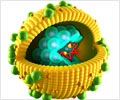Learn about recent advances in the treatment of Chronic Kidney Disease patients with Hepatitis C Virus infection.
Patients with chronic kidney disease (CKD) have a higher incidence of Hepatitis C Virus(HCV) infection compared to the general population. This is in large part due to the increased risk of HCV transmission associated with multiple blood transfusions and chronic dialysis therapy.
HCV infection itself can cause kidney injury from viral protein/immune complexes blocking the normal filtering capacity of the kidneys, so HCV can either be a cause or complication of CKD. HCV infection in CKD patients is associated with a poorer overall survival, the development of liver cirrhosis and poorer outcomes after kidney transplant compared to transplant recipients without HCV infection.HCV infection among Indian CKD patients on dialysis is a significant problem, with at least 27.7% of all Indian dialysis patients being HCV-antibody positive. These patients need to spend longer periods of time on the dialysis machine, have more dialysis related complications and have a poorer long-term survival.
Recent Study on HCV Treatment in CKD Patients
Recent advances in HCV treatment options have led to a number of medications that can completely cure HCV in the majority of patients, representing several major breakthroughs in the treatment of this dreaded disease. A recent study from the drug company Merck has announced a 99% cure rate of HCV in patients with CKD using the once daily combination of the antiviral medicines grazoprevir and elbasvir. This Phase 2/3 Trial (a fast-track study design combining safety and efficacy investigations) has yet to be accepted in a peer reviewed scientific journal, but preliminary data were presented as a poster at the European Association for the Study of the Liver (EASL) 50th International Liver Conference in April 2015 in Vienna, Austria.It is important to note that the study drugs grazoprevir (an NS3/4A protease inhibitor) and elbasvir (an NS5A replication complex inhibitor) are not yet FDA approved for commercial human use, but the preliminary favorable results and absence of significant drug side effects are very promising for patients with CKD who are infected with HCV.
The study enrolled 224 patients with CKD (18% Stage 4, 82% Stage 5, of whom 75% were on dialysis) and grouped them into an immediate treatment group (n=111) and a deferred treatment group (n=113), the latter group receiving a placebo for 12 weeks followed by treatment. A total of 116 patients were included in the final efficacy analysis and 115 (99%) achieved a “sustained viral response” (SVR, or absence of detectable virus in the bloodstream) after 12 weeks of therapy). The study was confined to patients with HCV Genotype 1.
Side effects occurred in about 15% of study participants and included headache, nausea and fatigue. Only 3 participants dropped out of the study due to adverse drug effects.
Study Significance
Although preliminary, the results of this study—the first to systematically study treatment of HCV in CKD patients—demonstrate that this difficult patient population can be successfully treated to eradicate detectable virus with minimal side effects. If treatment with HCV antiviral medicines is initiated early, the potential exists to prevent end stage kidney disease caused by HCV. Furthermore, kidney and liver transplant patients with HCV can now be expected to have improved outcomes if HCV is eradicated before or shortly after transplant.Glossary
Chronic Kidney Disease (CKD) Stage: Degree of kidney damage and reduction of normal function in patients with chronic kidney disease. Stage 5 is end-stage damage, requiring dialysis or kidney transplant.Genotype: The genetic code that defines a subtype of virus. For example, HCV has 6 major genotypes and several subtypes (1a, 1b, 2a, 2b, etc.) each having their own clinical behavior and response to treatments. Genotype 1 is the most common in the U.S. and is the most difficult to treat. In India, Genotype 3 is the most common and is relatively easier to treat.
Phase 2/3 Clinical Trial: a fast-track study design combining safety and efficacy investigations.













